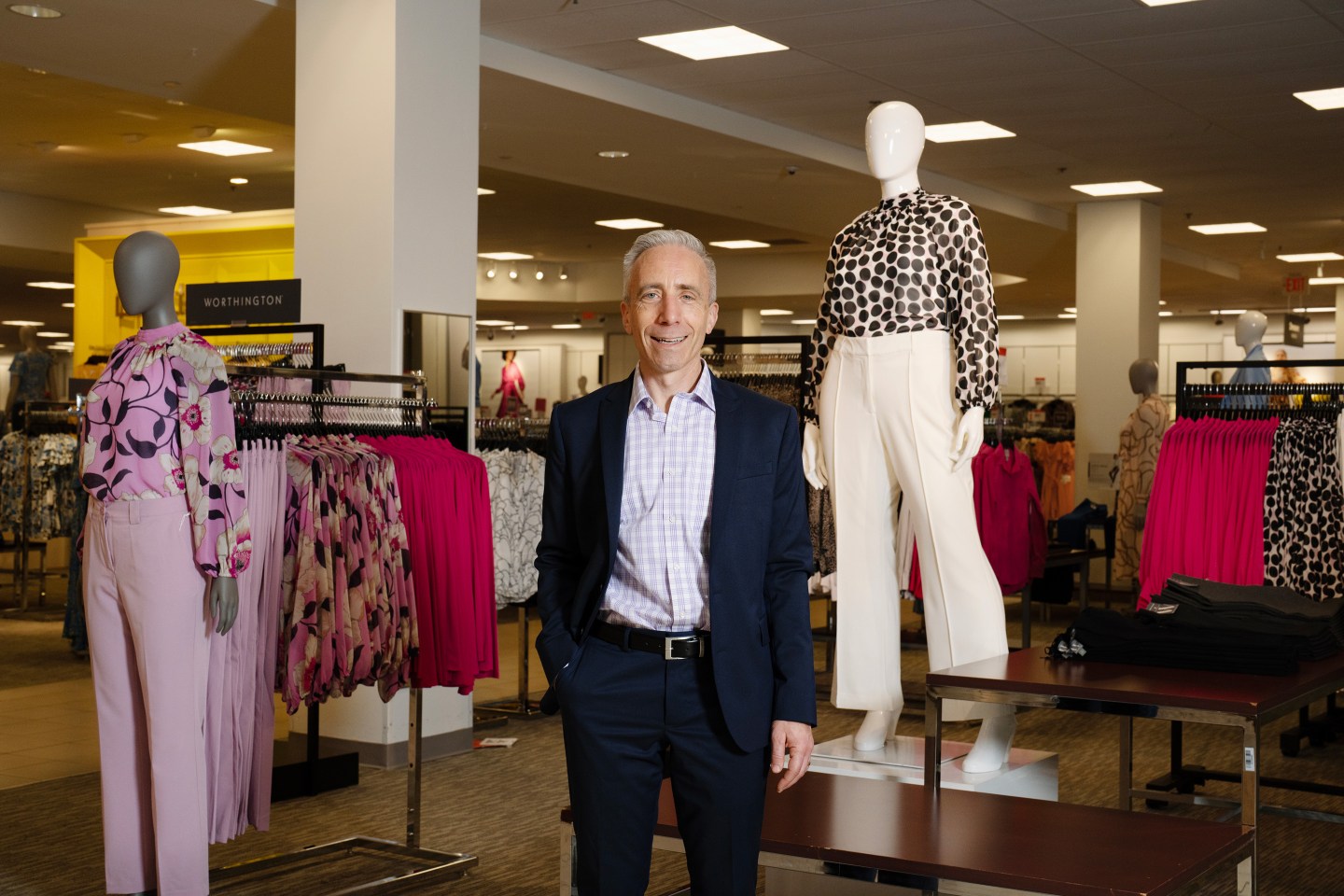Good morning. Fortune senior writer Phil Wahba here, filling in for Alan.
It’s amazing how much traction a corporate turnaround can gain when a CEO decides to root the plan in excelling at a company’s basics rather than trying to dazzle everyone with flashy moves. Take J.C. Penney. In the decade leading up to its bankruptcy protection filing in 2020, the department store had lurched from one reinvention to the next, yet none stanched the years-long sales slide and market share erosion.
Remember when Ron Johnson of Apple fame tried to make Penney cool with fancier brands and by ditching coupons? Or how Penney desperately chased millennials—considered young at the time—even though its core shopper was a suburban mom, and then, out of the blue, entered categories like big-ticket appliances?
For a column published this morning, J.C. Penney CEO Marc Rosen walked me through his new plan and why he thinks it’s the one that will finally do the trick. Rosen, who spent years at Levi Strauss and Walmart before joining Penney as CEO in 2021, says no revitalization plan, no cool influencer collab, no new beauty brand can work for Penney unless it nails basics like having an up-to-date e-commerce site, meeting customer demand, and building supply chain and data analytics capabilities to ensure shelves remain stocked.
“In the past, you’ve seen the company chase shiny objects and try to come out with a ‘big bang’ solution,” he told me. “This time, we’re saying we’ve got to fix the foundation.”
The same philosophy has worked wonders at other companies. In the retail industry, we are seeing bookseller Barnes & Noble thrive again by focusing on, well, bookselling, rather than hawking knickknacks and making e-readers. Target taught the same lesson with its big turnaround in 2017. And so on.
Of course, it helps Rosen that Penney is privately held, and therefore doesn’t have to deal with the pressure of Wall Street or possible activist investors while he tends to mending the basics.
There are initial signs Rosen’s turnaround is working: Simon Property Group, one of Penney’s owners, said last month that Penney is “incredibly profitable” even as it faces slowdowns in consumer spending in two key categories, apparel and home goods. Penney took in about $9 billion in sales last year and operated 665 stores, making it roughly half the size it was a decade ago. But Rosen says the business is stable now.
Part of Rosen’s repair job has been winning over employees, who have seen countless rounds of layoffs and years of sales declines. When Rosen became CEO, he set about meeting as many store-level workers and middle managers as possible to boost morale and reassure employees that Penney finally had a cogent plan and that they were needed. “One of the really pleasant surprises was the strength of the culture. We have a really committed team,” said Rosen.
You can read the full story here.
Phil Wahba
phil.wahba@fortune.com
@philwahba
TOP NEWS
A.I. personal assistant
According to Bill Gates, the impact of A.I. on the workplace may not be as significant as many fear. Instead, Gates views A.I. as a "copilot" that will enhance workplace efficiency by assisting with tasks such as email composition and inbox management. Fortune
Disney’s gay rights summit
The Walt Disney Company will host the Out & Equal Workplace summit promoting LGBTQ+ rights in Central Florida this September amid Gov. Ron DeSantis's anti-diversity training push and following the entertainment giant's opposition to the state's 'Don't Say Gay' bill. The event is expected to attract over 5,000 attendees, with sponsors such as Apple, McDonald's, and Amazon. Miami Herald
Domino’s gives up on Italy
A Milan-based judge has put the Italian franchise of Domino's Pizza into liquidation after the business struggled to attract customers. The franchise partner, ePizza SpA, had submitted a draft restructuring plan last year, which indicated that creditors could recover 5% of their exposure through court-ordered liquidation. Bloomberg
AROUND THE WATERCOOLER
TikTok’s CEO is about to introduce himself to America, but the ex-Facebook intern’s charm offensive faces a hostile audience by Andrea Guzman
Moderna’s CEO defends the decision to more than quadruple the price of the COVID vaccine and charge around $130 in Senate hearing by Tom Murphy and The Associated Press
Silicon Valley Bank might have just blown up a banking regulation that was put in place at the depths of the Great Depression by Will Daniel
Nvidia and Adobe think they may have solved generative A.I.’s copyright problem by David Meyer
The slumped housing market reaches a critical juncture—aggressive homebuilder incentives and price reductions are working by Lance Lambert
This edition of CEO Daily was edited by Jackson Fordyce.
This is the web version of CEO Daily, a newsletter of must-read insights from Fortune CEO Alan Murray. Sign up to get it delivered free to your inbox.













